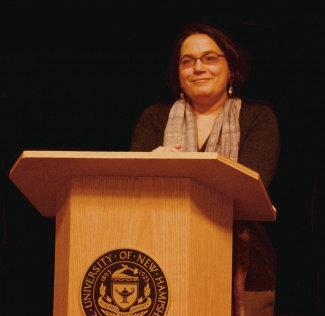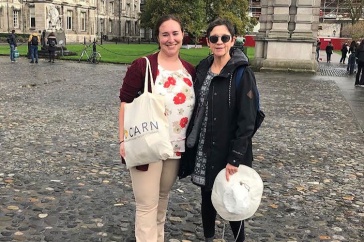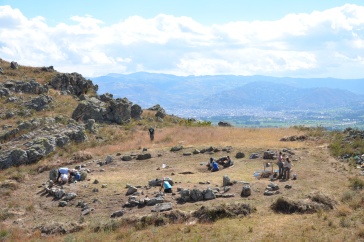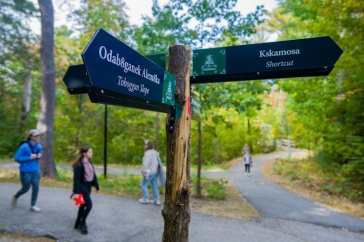In a courtroom at Guantanamo Bay, a pane of glass separates victims’ family members and Sept. 11 first responders from the men known as the 9/11 Five, suspected conspirators in the terrorist attacks on that day in 2011. There, a military judge and five legal teams, one for each defendant, debate what evidence should reach trial.
History professor Julia Rodriguez found herself behind that glass in December after winning a victims’ family lottery to observe the pretrial hearings. Her brother, Gregory Rodriguez, was killed in the Sept.11 attacks on New York City. Earlier this year an article she penned about her trip to the military prison was published in Time magazine.

“Wanting to go was part of my personal drive to understand what happened to my brother,” said Rodriguez during a recent lecture held at UNH. “When you lose someone, you want to know more about the things that involve them and the things that happened to them. It makes you feel reconnected to them.”
The courtroom was constructed in 2012 specifically for the case due to its peculiar nature — five simultaneous defendants — and a combination of federal, military and international law. On one the side of the room there are 12 empty seats for a panel, a military court’s jury, should the case reach trial.
Each defendant has up to five civilian lawyers and a translator. Charged with various crimes related to the Sept. 11 attacks, the men are referred to only by their initials in a room Rodriguez described as, “full of heightened emotion and repetitive legal arguments.” The arguments are not allowed to delve into confidential information. If they do, the judge is authorized to abruptly end the day’s hearing.
Victims’ families stay in trailers where legal teams brief them on the case. “I have to say they treated us quite graciously,” Rodriguez said.
Family members and first responders, brought in 11 times a year for a week at a time, travel to Cuba on a military chartered plane and then travel by ferry to the naval base that houses the court complex. The only other civilians allowed to the area are authorized personnel and human rights legal scholars.
“It is totally restricted. I don’t think they let media there. We were absolutely forbidden,” Rodriguez said. “We weren’t even told where it was. I was there strictly to observe the pretrial hearings.”
“Going into this with an open mind and realizing I knew very little, I was wondering, ‘What does justice mean? What does justice for the 9/11 victims mean?’” said Rodriguez. “What is justice and how is it best served? What kind of country do we want to live in? How are we going to uphold our fine principles?”
On returning from the trip, Rodriguez reached a conclusion. “I would encourage everybody to think about what our role is in demanding rule of law and in demanding how our Constitution is upheld,” she said. “I personally won’t be satisfied unless I know the legal proceedings are legitimate.”
Rodriguez is the author of “Civilizing Argentina: Science, Medicine, and the Modern State,” (UNC Press, 2006). From 2011 to 2012, she was a Peggy Rockefeller Visiting Scholar at Harvard University.
The lecture was co-sponsored by the Departments of History and Political Science, The Justice Studies Program and the Center for International Education.



















































